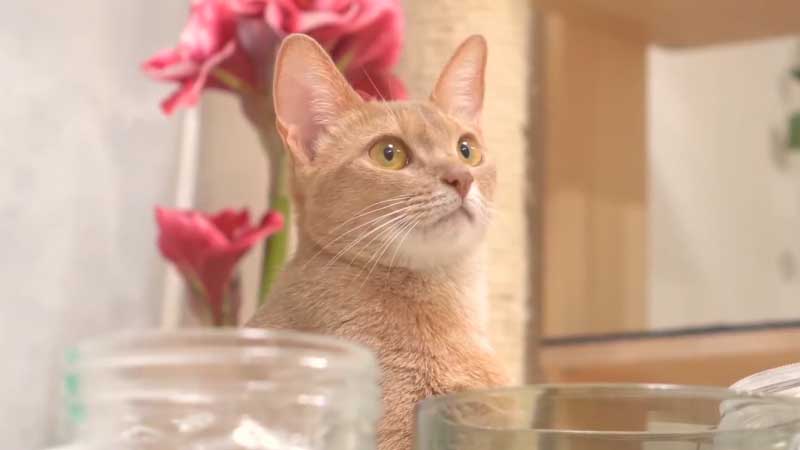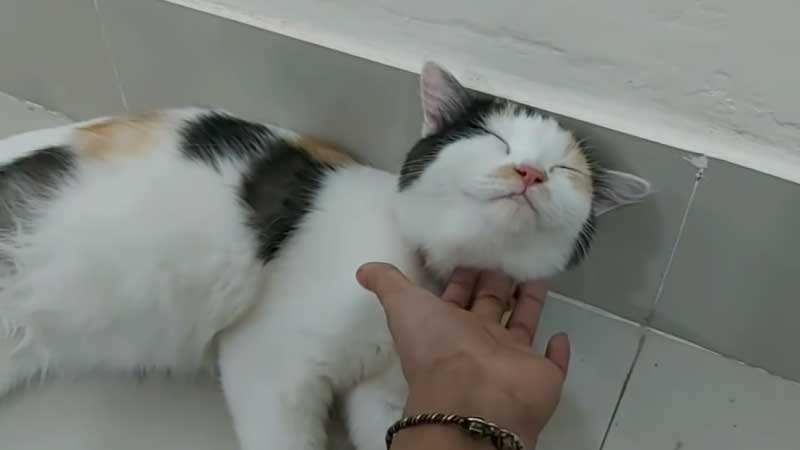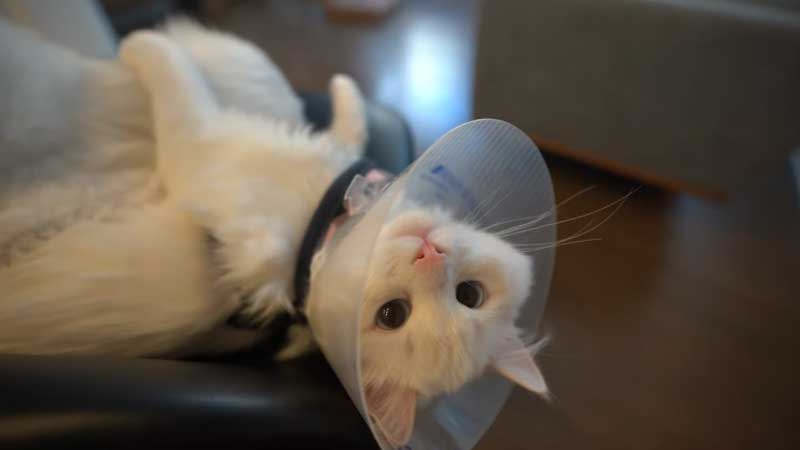The Abyssinian cat breed is appreciated for their lively personalities in addition to their physical attractiveness. These medium-sized cats are not only affectionate and loving, but also highly intelligent and curious. Their playful nature, coupled with an impressive adaptability, makes them a delightful companion in various households. Whether scaling tall furniture or engaging in interactive play, Abyssinians are a source of endless entertainment and joy.
This guide delves deep into the Abyssinian cat breed information, aiming to uncover every facet of these fascinating creatures. From their historical roots to their care needs and common health concerns, we will explore what makes the Abyssinian cat a truly exceptional breed.
Abyssinian Cat Breed Information
| Category | Description |
|---|---|
| Name | Abyssinian |
| Other Names | Aby, Bunny cat |
| Origin | Believed to be Abyssinia (Ethiopia) |
| Size | Medium-sized cat |
| Height | Not specified in sources |
| Weight | 8-12 pounds |
| Lifespan | 9-15 years |
| Colors | Ruddy, fawn, blue, cinnamon |
| Coat Length | Short |
| Coat Patterns | Ticked tabby coat |
| Temperament | Active, playful, affectionate |
| Suitable for | Families, individuals seeking an active and affectionate pet |
Abyssinian Cat Breed Characteristics

The Abyssinian cat breed is renowned for its distinctive combination of physical agility, emotional intelligence, and engaging temperament. These cats not only show a striking appearance but also possess a range of characteristics that make them unique among felines. Here is a detailed table that breaks down these characteristics, offering insights into what future pet owners can expect from this charming breed.
| Characteristic | Rating (Low, Medium, High) | Description |
|---|---|---|
| Adaptability | High | Abyssinians adjust well to different environments and lifestyles, making them suitable for various households. |
| Intelligence | High | Known for their sharp minds, Abyssinians are quick learners and enjoy interactive play that stimulates their intellect. |
| Playfulness | High | Highly playful, they love engaging in games and are known for their active nature. |
| Affection Level | High | Abyssinians are affectionate and develop strong bonds with their family members, though they may show a shy side to strangers. |
| Energy Level | High | They are energetic cats that require ample playtime and exercise. |
| Dog Friendly | Medium | Generally good with dogs, especially if socialized from a young age. |
| Kid-Friendly | High | Abyssinians are great with children, thanks to their playful and gentle nature. |
| Stranger Friendly | Medium | While loving with their families, they can be shy or reserved around strangers. |
| Exercise Needs | High | They have high exercise needs and enjoy climbing and exploring. |
| Health Issues | Medium | Generally healthy but prone to certain genetic conditions like patellar luxation and renal amyloidosis. |
| Shedding | Low | With their short coats, Abyssinians shed less than many other breeds and are relatively easy to groom. |
| Grooming | Low | Their short coat requires minimal grooming, though they enjoy being combed or rubbed with a chamois cloth. |
Overview of the Abyssinian Cat Breed

The Abyssinian cat, with its mesmerizing appearance and dynamic personality, is a breed that stands out in the feline world. Understanding both the pros and cons of owning an Abyssinian is crucial for anyone considering adding this breed to their family.
Pros
Cons
Abyssinian Cat Personality
Abyssinian cats are often appreciated for their distinctive personality traits, which include playfulness, intelligence, and affection. These qualities combine to make the Abyssinian an engaging and delightful companion.
- Playfulness: Abyssinians are inherently playful and remain kitten-like in their behavior well into adulthood. They are known for their love of games and are often seen engaging in playful antics, such as chasing toys or exploring their surroundings with a keen sense of curiosity.
- Intelligence: This breed is highly intelligent, which is evident in their quick learning ability and problem-solving skills. They enjoy interactive toys and games that challenge their minds, making them an ideal pet for owners who appreciate an intellectually engaging feline.
- Affection: Abyssinians are affectionate and love to be involved in the activities of their human family members. They form strong bonds with their owners and often seek out their company. Despite their affectionate nature, they may exhibit shyness around strangers, showcasing a reserved side of their personality.
Common Health Problems in Abyssinian Cats
Abyssinian cats, like all breeds, are susceptible to certain health issues. Being aware of these common problems can help owners provide the best care and potentially prevent or manage these conditions effectively. Here are some of the health issues commonly associated with Abyssinian cats:
Gingivitis
This is a form of gum disease that can affect Abyssinian cats. It involves inflammation of the gums and can lead to more serious dental issues if not addressed properly. Regular dental check-ups and good oral hygiene practices are important for preventing and managing gingivitis.
Patellar Luxation
This condition involves the dislocation of the kneecap, which can cause discomfort and mobility issues in affected cats. It can range from mild, requiring little to no intervention, to severe, which may necessitate surgical correction.
Hereditary Retinal Disease
Abyssinians can be prone to retinal diseases that are inherited. These diseases can lead to impaired vision or even blindness. Regular eye examinations by a veterinarian can help in early detection and management.
Familial Renal Amyloidosis
This is a kidney disorder where amyloid protein is deposited in the kidneys, leading to renal failure. It is a hereditary condition in Abyssinians, and while it cannot be cured, early detection and management can improve the quality of life for cats with this condition.
Urinary Tract Disease
Abyssinians may be prone to urinary tract infections and other urinary system-related issues. Symptoms can include frequent urination, discomfort while urinating, and blood in the urine. Prompt veterinary care is essential for treatment and relief of symptoms.
How to Care for the Abyssinian Cat Breed

Caring for an Abyssinian cat involves understanding their unique nutritional, grooming, and exercise requirements. These aspects are crucial for maintaining their overall health and well-being.
Nutritional Needs
- Abyssinians require a high-quality diet rich in protein, amino acids, vitamins, and minerals. This is essential for maintaining their muscular build and active lifestyle.
- They benefit from a high-moisture diet, especially if dry food is a significant part of their meals. Ensuring they have access to fresh water at all times is vital.
- Portion control is important to prevent obesity, although Abyssinians are generally good at regulating their own food intake due to their active nature.
Grooming Tips
- Despite having a short coat, Abyssinians do need regular grooming to keep their coat in top condition and to reduce shedding.
- A fine brush or comb can be used once or twice a week to remove loose hair and maintain the coat’s natural sheen.
- Abyssinians are not particularly fond of being held or restrained, so it’s important to get them accustomed to grooming from a young age. Gentle handling and positive reinforcement can make grooming sessions easier for both the cat and the owner.
- Regular nail trimming, ear cleaning, and dental care are also important components of their grooming routine.
Exercise Requirements
- Abyssinians are highly active and require ample opportunities for physical exercise.
- They enjoy climbing, so providing cat trees or high perches can satisfy this need.
- Interactive play is essential. Engage them with toys that stimulate their hunting instincts, such as feather wands or laser pointers.
- Despite their high energy levels, ensure they have a comfortable and quiet space to rest and recharge.
Frequently Asked Questions
What is the personality of an Abyssinian cat?
Abyssinian cats are known for their playful, intelligent, and affectionate nature. They are active and curious, often engaging in playful antics and interactive games. Abyssinians form strong bonds with their families, enjoy being the center of attention, and are sociable with both people and other animals.
Are Abyssinian cats good for families with children?
Yes, Abyssinian cats are generally good with children. They are playful and gentle, making them suitable companions for families. Their high energy levels and playful nature can be a good match for active children. However, as with any pet, interactions should be supervised, especially with younger children.
Do Abyssinian cats require a lot of grooming?
Abyssinian cats have short coats that require minimal grooming. A weekly combing is usually sufficient to remove loose hair and maintain their coat’s condition. They are not known for high shedding, and their grooming needs are relatively low compared to long-haired breeds.
How active are Abyssinian cats?
Abyssinians are highly active and energetic cats. They love to climb, jump, and explore their environment. Providing them with cat trees, high perches, and interactive toys is important to keep them stimulated and physically active.
Are Abyssinian cats prone to any health issues?
Abyssinian cats are generally healthy, but they can be prone to certain health issues such as gingivitis, patellar luxation, hereditary retinal disease, familial renal amyloidosis, and urinary tract disease. Regular veterinary check-ups and a healthy lifestyle can help manage these risks.
Can Abyssinian cats adapt well to living in apartments?
Abyssinian cats can adapt well to apartment living provided they have enough space to play and explore. Their active nature means they need ample opportunities for exercise and mental stimulation, so it’s important to provide interactive play and ensure they have vertical spaces like cat trees to climb.
Final Verdict
Abyssinian cat breeds lithe bodies, adorned with a uniquely ticked coat, mirror the grace and beauty of ancient cats, while their playful and curious nature ensures there’s never a dull moment when they’re around. These medium-sized cats, with their sociable and loving temperament, fit well in diverse home environments, from active families to single-person households.
However, it’s crucial to consider their needs and characteristics when deciding whether to bring an Abyssinian into your home. Their high energy levels and intelligence require engagement and stimulation, and while their grooming needs are minimal, they do require regular health check-ups to monitor for breed-specific health issues.




